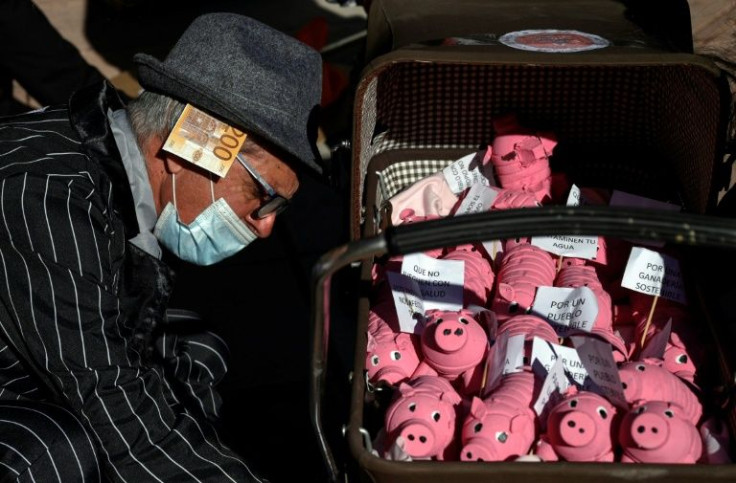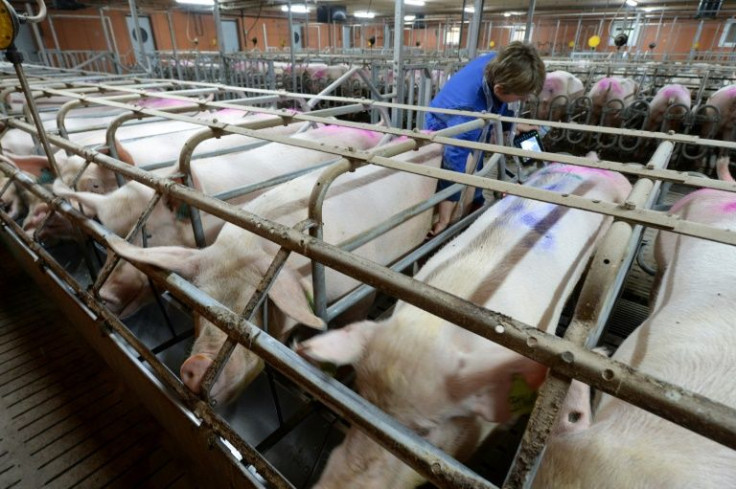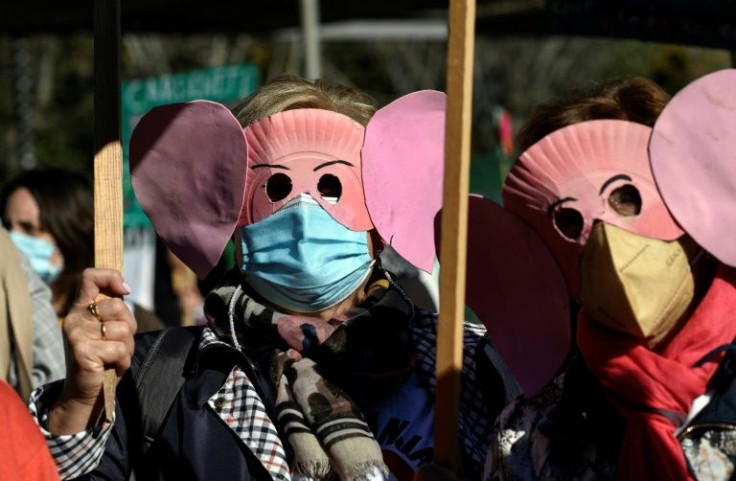Spanish Countryside Rises Up Against 'Pig Factories'
"That's not a farm, it's a factory... a pig factory," says Antonio Escribano as he stares at a huge metal frame in the middle of a field in Spain.
The 58-year-old local winemaker has for months been battling the planned opening of a large pig farm that will breed almost 40,000 piglets a year from 2,200 sows less than three kilometres (1.9 miles) from his town of Quintanar del Rey, in the central province of Cuenca.
Locals fear the pollution from pig manure, bad smells and flies, which they say the project will bring, and have staged regular protests against it.
The farm is just 350 metres (1,200 feet) from the wells that provide the town of around 7,000 residents with fresh water.

"If the water gets polluted, the village will be ruined," says Escribano, who speaks with a gravelly voice and has salt and pepper hair.
"People will leave as has happened in other villages and Quintanar will become a ghost village."
In response to the protests, local authorities have suspended work on the farm while they re-evaluate the project's environmental impact.
Some locals are pushing for the project by Spanish firm Jisap, which already owns 480 pig farms in Spain, to be shuttered for good.

"We must put an end to mega-farms," says Paciencia Talaya of the "Stop Mega-farms" group, which has led opposition to the project.
Over the past decade, mega-farms that produce livestock with the efficiency of auto assembly lines inside warehouse-like barns have multiplied across Spain, sparking opposition from local residents.
Fuelled by demand from China, Spain has become the European Union's top pork producer.
The number of pigs raised in Spain jumped 21.5% between 2015 and 2020, according to Greenpeace.

The country had a population of 56 million pigs in 2020 -- about nine million more than its humans, according to government figures.
"The sector generates a lot of money," says Remedios Bobillo, the head of "Alive Villages", a group set up in 2017 to fight the spread of mega-farms in Cuenca.
"Unfortunately, the villages don't benefit from it," she said.
The group staged a protest on Sunday in Cuenca against the "sale of villages" to agri-food companies which drew around 1,000 people.

"Spain has become the dump of Europe and China. That can't be," says Bobillo.
Putting thousands of animals in one enclosure produces huge amounts of manure.
Unlike human sewage, which is treated before it is released into waterways, animal waste is stored, then spread on croplands as fertilizer.
Environmental groups say fields often can't handle the volumes of manure produced, leading to runoff that pollutes groundwater with nitrates and ammonia.
Pig farming also consumes vast quantities of water in a country frequently affected by drought.
Critics also say the barnyard whiffs from the farms of the past were nothing like the overpowering stench from today's supersized operations.
"At some times of the year, the air is unbreathable," says Toni Jorge of Ecologists in Action as he stands outside a pig factory farm in Cardenete, a village of about 500 people east of Cuenca.
Opened five years ago, the farm is home to 6,400 pigs that produce enough manure each year to fill four Olympic-sized swimming pools, he says.
Unlike in smaller farms, the pigs here are packed together with no access to the outdoors and daylight except for the day they are taken to slaughter, says Jorge.
Industry groups argue there are plenty of strict rules regarding the treatment of manure and livestock farmers are adopting improved methods and technology.
The sector follows "European directives on animal wellbeing", which are a "world reference", says the head of Spanish pork producers association Anprogapor, Miguel Angel Higuera.
"Spain is the only country in the world which limits farm capacity and imposes a minimum distance between farms and residential areas," he adds.
The farms are one of the "rare activities" that provide jobs in rural Spain, which is suffering from depopulation, and help keep villages "alive", he adds.
He estimates about 250,000 people work in the pork sector in Spain.
But Talaya of "Stop Mega-farms" said most work on industrial farms is mechanised.
Standing beside her, Escribano agrees.
"They say they are helping to keep people in villages. But who is going to live in a village where you can't breathe, where you can't drink the water?" he asks.
© Copyright AFP 2024. All rights reserved.











